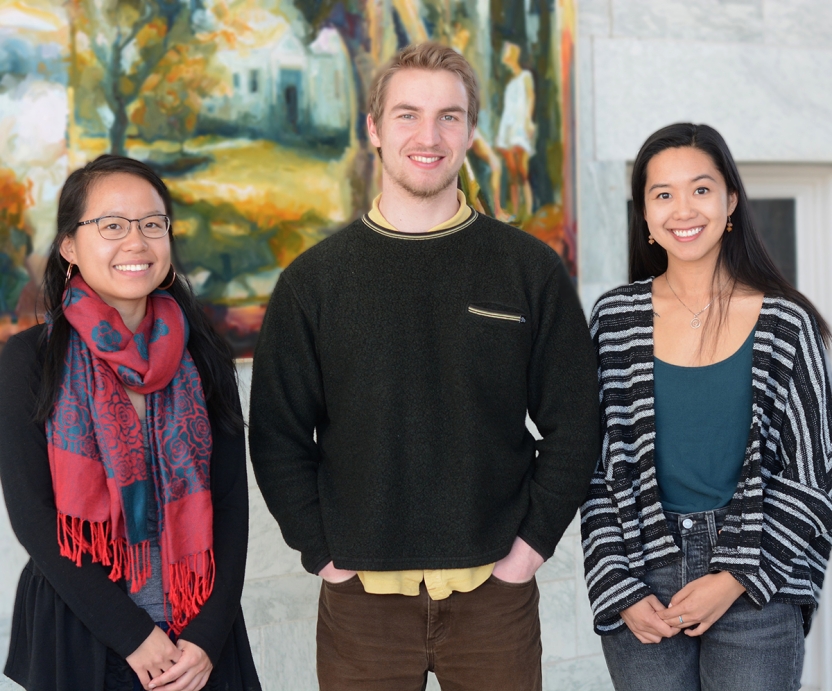Three Middlebury Students Earn Watson Fellowships

Story updated on 3/4/24.
MIDDLEBURY, Vt. – Three Middlebury College students have been named Thomas J. Watson Fellows and will embark on a year of travel study after graduation. The Watson Foundation recently announced its 50th class of fellows, who will receive $30,000 for 12 months of travel plus college loan assistance as needed.
Leo McElroy ’18, a joint major in physics and computer science from Westport, Connecticut, loves makerspaces and has been drawn to places that he describes as supporting the pursuit of curiosity. “I knew I was interested in visiting makerspaces around the world before I thought it could be a Watson,” said McElroy. As he tries to better understand the global significance of the maker movement, McElroy has developed a project titled “Makerspaces: Education, Industry and Community.” After graduation, he will travel to India, China, Japan, Germany, Norway, and Romania to discover the ways makerspaces “are changing the way people learn, work, and play.”
“The places and countries I chose in my itinerary were locations that just soaked into my awareness over the years,” said McElroy. “I wanted to select places that embodied the different roles makerspaces can have in society: community centers, economic stimulators, schools. Specifically, I was interested in how makerspaces can create alternative routes for people to excel in these fields and how they can empower individuals while helping them engage their communities.”
McElroy says he hopes to one day build tools that help people better express themselves, feel more actualized, and do things they wouldn’t otherwise be capable of. “I’d like to develop both technology—like digital fabricators—and systems such as schools and makerspaces themselves to these ends. My Watson will help me understand what tools people need and how to design tools well.”
“I’m most excited to see how this common theme of makerspaces can bring me to places which may otherwise seem disparate: like from a small village in Norway, to a rural school in India, to one of the world’s major manufacturing hubs in Shenzhen,” said McElroy.
Elizabeth Zhou ’18, a psychology major from Okemos, Michigan, will explore societal definitions of “insanity” and “wellness” in a project titled “Experiences of Mental Abnormality.” Zhou will travel to Finland, Belgium, Zimbabwe, and Peru over the course of her Watson Fellowship.
There is no global definition of pathology or normalcy, says Zhou, but rather a wide range of cultural interpretations of the human experience. “The goal of my Watson is to explore the ways in which cultures comprehend and address mental abnormality.”
“My Watson project is my attempt to explore more culturally specific understandings of mental health,” said Zhou. “This begins by acknowledging that not all mental conditions that might be seen as “abnormal” are necessarily a form of “mental illness”—a highly subjective, and stigmatized, label.”
Zhou says the countries she chose, after a fair bit of research, offer subcultures with unique approaches to mental abnormality: open-dialogue therapy in western Lapland, Finland; the deinstitutionalization of psychiatric care in Geel, Belgium; shamanic practices in Zimbabwe; and plant medicine in Iquitos, Peru.
“I’d like to enter the psychotherapy profession in the future, particularly the up-and-coming field of psychedelic therapy,” said Zhou. “My Watson project feels like a really valuable opportunity to learn about phenomena in psychology that I would otherwise only read about online, or not encounter at all.”
Tina C., a double major in computer science and geology from Alhambra, California, will travel to six countries—Tajikistan, Nepal, India, China, Lesotho, and Peru—for a project she’s titled “Climate Change Adaptation in Indigenous Mountain Communities.” She plans to learn about how indigenous mountain communities are adapting to climate change and “how their adaptations alter their cultural landscape and food production.” She plans to interview community members, government officials, and conservationists to better understand their situations.
“While I have studied mountains extensively in many different facets and locations, from how they affect microclimates to how they have changed the landscape of a place, and from the deep oceans to Jupiter’s moon, there seems to be a missing human aspect to all of my previous research,” she said. “I believe a focus on food offers a different framework for thinking about the transformation caused by climate change, as food reveals the unique and distinctly human experience of each community.”
C. hopes her work may someday encourage international cooperation to improve agricultural productivity in the face of climate change. “In order for scientists and policymakers to tackle the problems of climate change in vulnerable regions, it is imperative to bridge traditional knowledge and scientific knowledge by bringing the voice of lived experience into scientific research,” she said.
The Watson Foundation was created in 1961 as a charitable trust in the name of Thomas J. Watson Sr., best known for building IBM. Through its programs, and more than 100 global partnerships, the foundation provides students with personal, professional and cultural opportunities that expand their vision, test and develop their potential, and build their confidence and perspective to do so for others. Watson Fellowship recipients are selected from 40 partner institutions across the U.S.

